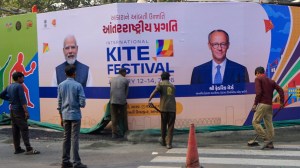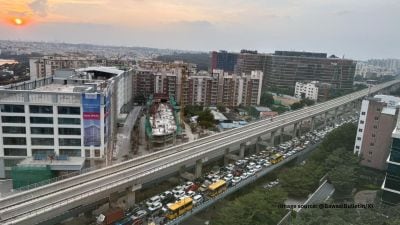Stay updated with the latest - Click here to follow us on Instagram
Protest Movement
When you meet Sumangala Damodaran,it is difficult to imagine the 43-year-old as someone belting out songs of protest.
Sumangala Damodaran,grand-daughter of former Communist leader EMS Namboodiripad,on her debut album comprising songs of protest
When you meet Sumangala Damodaran,it is difficult to imagine the 43-year-old as someone belting out songs of protest. But for the professor of Economics at Ambedkar University,also the grand-daughter of EMS Namboodiripad,the first Chief Minister of Kerala,protest has been a way of life for as long as she can remember. I learnt to sing Jaane Waale Sipahi Se Poochon …,a popular post World War II protest song,from playwright Safdar Hashmi and we would recite it in our theatre group Parcham routinely, reminisces Damodaran,sitting in her residence at Mayur Vihar,Phase-I. Damodaran has finally released her debut album Songs of Protest (EMI,Rs 295) comprising nine songs based on her documentation of the Indian Peoples Theatre Associations (IPTA) musical traditions. Singer-composer Susmit Sen of the Indie-folk outfit Indian Ocean has produced the album. I approached Susmit to produce the album a year ago since I wanted to render these songs with an archival quality. In the course of his hectic schedule he managed to arrange the music in a little over a year, says Damodaran. The album has been supported by the National School of Drama.
Growing up in a politically-minded family in Hyderabad,it was her maternal grandfathers writings about the early political days of Keralas theatre that helped convincing her to track the IPTA musical traditions. I have read articles and books by my grandfather about Keralas radical theatre. Besides,since I was working with a group active in reciting protest songs,documenting IPTA traditions was a natural course, she explains,adding how her grandfather encouraged her work,even though he did not live to see the outcome of her research.
One of the most notable influences in the album is that of Urdu poet and Marxist leader Makhdoom Mohiuddin Huzri,whose classical melody has been revived with the use of guitar,drums and bass,that gradually merge in to a crescendo. We would sing his compositions during the 1984 Sikh riots in Delhi, recalls Damodaran,who compiled this album over the last four years. Incidentally,IPTA served as an instrument of mass mobilisation,national unity and had some of the most renowned musicians of the time Sahir Ludhianvi,Salil Chowdhury,Ravi Shankar in its ranks,giving rise to a rich repertoire of protest songs and plays.
Commonly misunderstood for having only songs of dissent in their repertoire,Damodaran consciously picked out songs which straddled a large variety of genres and emotions. I picked on songs that I felt happy singing and chose numbers that were commonly sung during the Independence movement, she explains. The nine songs are rendered in four languages: Malayalam,Hindi,Punjabi and Tamil. With a personal archive of over 100 songs,Damodaran included songs in the album that were rare and historically relevant. Through the Punjabi folk number Kinno Phool Dassan,she recalls the painful memories of the Bengal famine in lyrics penned by Swatantrata Prakash in 1943. The song has been sung like a Heer,which was taught to her by sufi singer Madan Gopal Singh in the early 90s. There is also an ode to the Jallianwala Bagh massacre with Din Khoon Ke Hamare sung by an unknown singer. There are several songs that I discovered stashed away in piles of books. In some cases I was able to find actual recordings of the song while in others I would recreate the rendition and authenticate it from someone, explains Damodaran,whose journey of archiving IPTA songs began when she traveled to Kolkata and met Shobha Sen (wife of actor Utpal Dutt) and chanced upon a treasure of unknown songs. The album includes a rare song,Aar Kotto Kaal,penned on the Te Bagha movement in West Bengal in pre-Independence India where peasants demanded 2/3 rd grains from their landlords. It was sung by IPTA singer Reba Roy Chowdhury. Damodaran has also included a popular Malayalee marching song,Bali Kudeerangale (martyrs memorial) in the album.
Apart from Sen,Damodaran also collaborated with musicians Tapan Mullick (cello) and Deepak Castelino (acoustic guitar) with whom she has worked with in the past. I havent changed the melody of the songs but have given them an Indian Ocean type sound, explains Sen.
Damodaran leaves next month for a cross-country tour hunting down other IPTA musical treasures,for an NSD-supported revival project. It will take me 5-6 months to travel across Andra Pradesh,Mumbai,Kerala and Assam (whose inventory is rare) and retrieve these songs. These will be later digitised and made available to the public, says Damodaran,who is also working on a book on the same.







